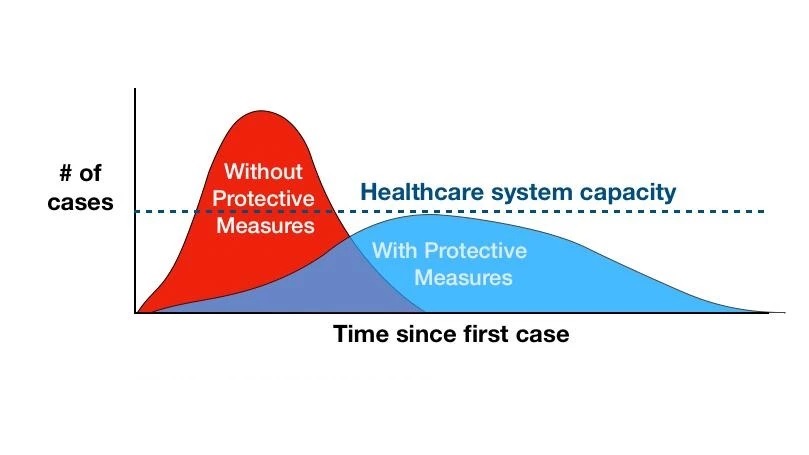Debate about total lockdown or #flattenthecurve

The National Institute for Public Health and the Environment (RIVM) advises the countries within the Kingdom not to proceed to a complete lockdown. Despite the increase in the number of deaths from COVID-19 in the Netherlands, it is important, according to the Government Advisor, to keep some social life possible. However, irresponsible behavior by people who do not practice social distancing can still lead to a complete shutdown of social life.
The RIVM argues that the Coronavirus epidemic can no longer be contained and could always resurge again in the future. Putting everyone under lockdown provides health benefits in the short term, but as soon as social life resumes, a new wave of infections will follow, and many people will die again, scientists at RIVM predict. They argue that only at-risk populations should be put into quarantine while the epidemic keeps spreading. Not everyone who comes into contact with the coronovirus develops Coronavirus Disease 2019 (COVID-19). Healthy people with good natural defenses have a high chance of becoming immune to the virus after infection, according to the RIVM. Building group immunity is seen as the only long-term strategy for dealing with the virus. This goal has become known as #flattenthecurve.
In the last century, the number of infectious diseases worldwide declined, until the early 1970s suddenly saw a rapid increase that has not stopped.
Since 1975 more than 30 new zoonoses have emerged – that is, diseases transmitted to people from animals. These diseases can be acquired directly, as when a person is bitten by an infected animal. They also can be acquired indirectly, in a number of ways. For example, a person might be bitten by a mosquito or tick that has picked up a pathogen from a host animal, causing dengue, chikungunya, zika, malaria or Lyme disease. Infectious diseases also may occur from consuming meat, fish, eggs and other foods contaminated with an animal-derived pathogen.
Zoonotic transmission of viral bacteria from livestock to humans occurs predominantly in cattle farmers and people who work in animal factory farms, slaughterhouses and butcher shops. For example, beginning in the mid-1980s, cattle herds in the United Kingdom have been hit by an outbreak of bovine spongiform encephalopathy, or ‘mad cow disease.’ This animal disease has been linked to the occurrence of a progressive and often deadly neurological disorder, called new variant Creutzfeldt-Jakob disease, in humans who have been exposed to diseased cattle or their flesh.
“Most people think of viruses as parasites, but they aren’t parasites at all,” writes Christian Cantrell, author of Containment. “An organism has to be considered alive to be classified as a parasite. Viruses don’t do any of things living organisms do. They don’t grow, they can’t move on their own, and they don’t metabolize. They don’t even have cells. But the one thing a virus is very good at is reproducing. When it finds a suitable host cell, it attaches itself and injects its DNA through the cell’s plasma wall. The virus’s genes are transcribed into the host cell’s DNA, and the host cell’s genetic code is rewritten. Whatever its job was before, its new job is to do nothing but produce copies of the original virus, usually until it’s created so many that the cell bursts open and spreads the infection.”
Bacteria are giants compared to viruses, most of them ten times the size of a virus. Bacteria are living organisms consisting of cells, the smallest being unicellular bacteria. When you disinfect your skin and surfaces in and around the house, killing bacteria also kills viruses in the bacteria. Social distancing is necessary to prevent the spread of both viruses and bacteria. It cannot be predicted which zoonotic pathogens are likely to emerge next or cause the biggest problem. Given the obvious link between human health and pathogens that circulate in domestic animals and wildlife, we must be alert to pathogen flow in any of these areas.
In an interview with De Volkskrant, crisis expert Ira Helsloot, professor of safety management at Radboud University, says a lockdown is not a good idea. “The long-term consequences for the economy, and therefore public health, will be many times greater than the health gains that you may make in the short term in the corona crisis.”
A total lockdown will push the economy into an even worse recession. The worse the economy goes, the less money is spent on health care and this will affect even more people in the future, especially those suffering from diabetes, cancer and other chronic diseases.
Currently, some social life is still possible on St. Maarten, but public safety is coming under pressure. The increasing violence on the street, with a fatal robbery in Simpson Bay and robberies in Maho and Philipsburg, can cause the government to decide to take a drastic measure, which does not exclude a total lockdown.


























